“There are things in this world that are just out of our control. Sometimes we like to blame ourselves for them so we can try to make sense out of them.”
The second season of 24 fails to reach the heights of the first season, but is nonetheless a competent and consistent effort that consolidates the template that season one introduced. It solidifies the focus on counter-terrorism and reaffirms its commitment to Jack Bauer as the protagonist. Although the formula is occasionally altered hereafter, the fundamental premise remains unchanged for the duration of the series.
In doing so, the show essentially forfeits the opportunity to tell an entirely different story. 24 could easily have been an anthology series, presenting days in the life of various protagonists who deal with different environments, situations and circumstances. Instead, the show maintains the ‘race against time’ and ‘ticking time bomb’ approach that is anchored by the turbulent journey of its magnetic lead character.
This is not a criticism, but an interesting observation. Whether due to a lack of ideas or a reluctance to change the series too drastically after a successful debut, the writers and producers responsible for creating 24 made a conscious decision to keep the status quo intact. They made a decision to keep telling a thriller story about terrorism and political conspiracies, including the myriad physical challenges and emotional hardships therein.
A Prescient Threat
The first hour of season two quickly establishes that an Islamic terrorist organisation known as Second Wave plans to detonate a nuclear device somewhere in Los Angeles at some point in the next 24 hours. The magnitude of the threat is a noticeable shift from the relatively small-scale assassination plot of season one. Millions of lives are now at risk as opposed to a handful of specific individuals.
This is an important benchmark for the series – every season hereafter features weapons of mass destruction in some way or another. In hindsight, the show may have raised the stakes too high too early. This may have hampered its ability to tell compelling stories in later seasons where the trend of escalation started crossing into absurdity. On the other hand, it was arguably a natural stepping stone given the state of the real world at the time.
Season two was the first to be conceived after 9/11, allowing it to more closely reflect the fears and anxieties sweeping American society. When the season premiered in late-2002, the most prevalent fear was the possibility that terrorists could acquire a nuclear device and detonate it on American soil. The show responded by presenting a hypothetical situation where that fear becomes a reality.
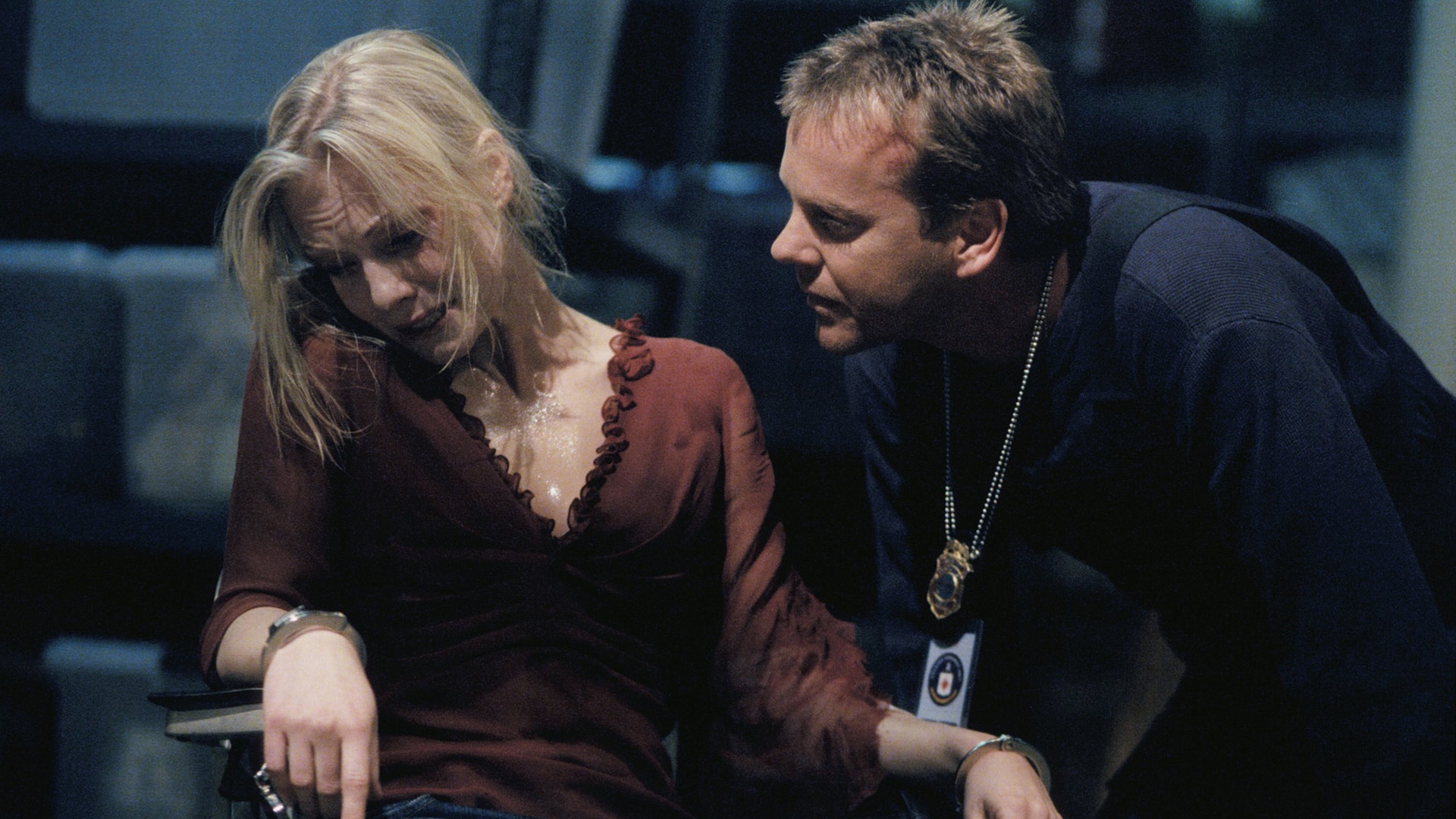
Season two also demonstrated a remarkable prescience, anticipating real-world events before or as they happened. For example, the story arc involving the Cyprus recording that falsely implicates three Middle Eastern countries in the detonation of the nuclear device in Los Angeles began just days after the United States invaded Iraq based on faulty intelligence pertaining to weapons of mass destruction.
This was almost certainly an unintentional coincidence, given that the scripts for those episodes would have been written weeks or months in advance. This was neither the first nor the last time that 24 seemed to predict and influence the future. Indeed, the successful election of Barack Obama in 2008 has been partially attributed to David Palmer, a character whose integrity made people enamoured with the idea of an African-American president.
The Curious Case of Season Two
Like season one, season two focuses on a single issue that generates a 24-hour response. The first fifteen hours focus on locating and securing the bomb while the remaining nine hours deal with the consequences of its detonation. A number of antagonists attempt to complicate the process for the heroes, including obstructionist bureaucrats, warmongering politicians, militant Islamic fundamentalists, and opportunistic oil tycoons.
Season two is well plotted, avoiding the issues that plagued the second half of season one. The plot develops unpredictably yet naturally, fluidly transitioning from one crisis to the next without losing sight of the central threat. This is an improvement over season one, which was forced to revitalise story arcs after the thirteenth episode. Generally, season two is less clumsy and contrived with its developments than other seasons.
The Kim storyline is an exception. Her melodramatic trials and tribulations grow tiresome, but they are a necessary evil that places the nuclear threat in a more human context. While other characters deal with the threat directly, Kim is an ordinary person whose escape from the city emphasises the urgency of the situation. Her interaction with other ordinary people, including Lonnie and Ramon, also highlights the volatile nature of the situation.
Fortunately, the weakest moments of the season are almost exclusively contained to this storyline. This one weak thread allows the rest of the story to maintain focus and intensity without wandering off and getting distracted by dozens of smaller things. It also fills out time, sustains the more important storylines, and gives Jack something personal to worry about without necessitating his involvement.
However, despite the strength of its plotting, season two is strangely unmemorable and uninteresting. The reasons for this are not easily discernible. Aside from Kim Bauer and her antics, there are few obvious low points and the rest of the story is remarkably consistent in quality. This requires us to deepen our understanding of what constitutes a strong and memorable season of 24.
A Deficiency of Interesting Characters
I consider the first season to be the benchmark which every other season of the show should be measured against. Three major components working in tandem contributed to its success; focused storytelling, clear themes, and interesting characters. Season two is deficient in one of these; characters. Their backstories are less weaved into the story, their relationships have less importance, and their motivations are explored less extensively.
Season two seems less concerned with three dimensional characters and more with how they service the machinations of the plot. This is especially true for the villains who are mostly poorly drawn caricatures. Syed Ali wants to kill Americans but his beliefs and ideologies are barely examined. Marie Warner is an extremist whose radicalisation is waved away. Peter Kingsley and his fellow conspirators seek profit simply for the sake of profit.
These antagonists are not fighting for anything the audience can even remotely identify with. They also have no personal connection to the protagonist or any of the supporting characters. The one exception is Nina, and it is no coincidence that her episodes are some of the most memorable of the season. The Drazens, though entirely unsympathetic and reprehensible, were at least humanised and motivated by the deaths of family members.
Not even the main characters are immune to this shift away from character-driven storytelling. For example, an initially reluctant Jack Bauer is eventually compelled to save lives because he could never live with himself if something happened that he may have had the power to stop. This is a selfless and noble reason to get involved, but that is the extent of his motivations throughout the season and they are not particularly interesting.
The problem is exacerbated by villains with superficial or non-existent connections to Jack. Eddie Grant and Jonathan Wallace appear in only a handful of episodes, preventing any meaningful development or interplay. Furthermore, they have only met him on brief occasions or worked with him in limited capacities. Neither of these characters elicit strong feelings or pose a significant challenge – they are shallow and forgettable.
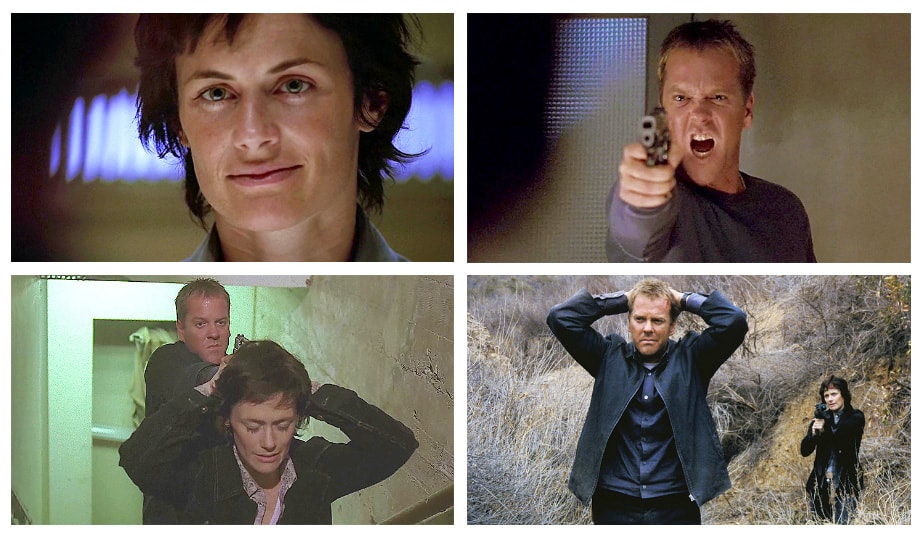 Jack versus Nina was a highlight of the season.
Jack versus Nina was a highlight of the season.
Conversely, the episodes with Nina feature fantastic tension and drama. These episodes engage and resonate precisely because of the rich and deeply personal history between them. Jack is forced to bury his feelings and cooperate with Nina while she manipulates the situation to guarantee her freedom and survival. This culminates in an incredibly tense hour where Nina takes Jack hostage, offering the location of the bomb in exchange for immunity.
When Jack has a personal reason for being involved and has personal connections with the villains, the show can be irresistibly compelling. Everyone remembers when Jack rescues his family from Ira Gaines or saves Audrey and her father from execution. Everyone remembers when Jack slaughters the Drazens to avenge his daughter, apprehends Stephen Saunders, executes Christopher Henderson, interrogates Charles Logan, and beheads Cheng Zhi.
These are characters that have threatened people Jack loves. These are characters that have betrayed him and taken something important away from him. These are characters that he has developed feuds with over multiple episodes and seasons. Season two is mostly devoid of these characters, removing the personal dimensions that explore different aspects of his character as well as the substance that helps establish a truly memorable season of 24.
The Upside
In fairness, season two is a lot better than this analysis makes it seem. The political storyline is probably the best in the series. The intrigue and sense of paranoia that sweeps through the Palmer administration as layers of the conspiracy are unravelled is exceptional. This culminates in Palmer being stripped of his presidency due to perceived inaction in the face of aggression, further heightening the tensions surrounding an impending world war.
Sherry returns and her Machiavellian compulsions are even more entertaining than the first season. Alongside Nina, she is the only other antagonist of the season with any impact. Her bitterness at being shut out of the White House creates an interesting dynamic with her ex-husband as the crisis unfolds. Novick also has an opportunity to shine, becoming another example of the dangers of compromise when he betrays David and endangers Lynne Kresge.
George Mason is, unexpectedly, one of the highlights of the season. His transition from untrustworthy bureaucrat to tragic hero is a surprising yet natural development catalysed by his lethal exposure to radiation, culminating in one of the most affecting moments in the history of the show. The brief reunion with his son and his silent clock again showcases 24’s ability to offer genuine character moments against a backdrop of high-octane action.
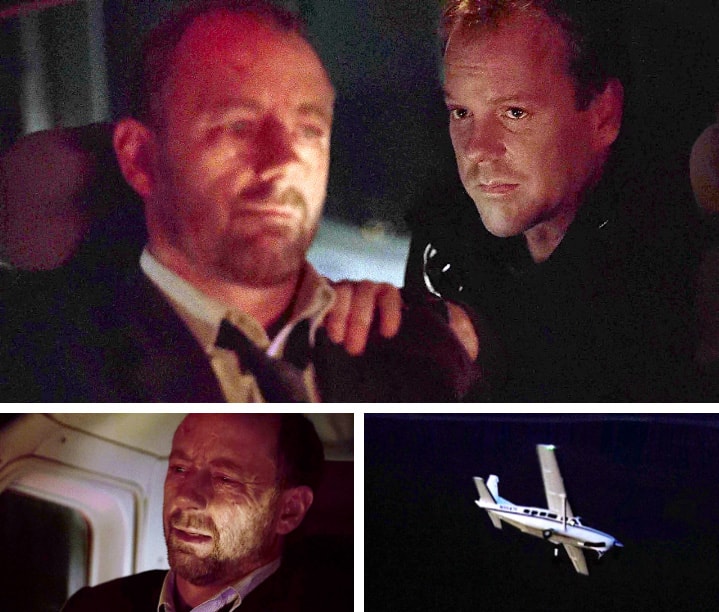 George Mason takes the plane down in Mojave Desert, saving thousands of lives. This episode received four Emmy nominations.
George Mason takes the plane down in Mojave Desert, saving thousands of lives. This episode received four Emmy nominations.
This illustrates another important aspect of the show. Character development is compressed, occurring in hours instead of weeks or months. 24 does not have the luxury of jumping ahead in time, so it subjects characters to extreme situations and circumstances that propel their growth more rapidly. George Mason becomes a barely recognisable character in the space of fifteen hours, but it makes sense given what he has experienced.
The fifteenth episode is the best of the season and, arguably, one of the very best of the series. Jack jumps at the opportunity to transport the bomb outside of Los Angeles, preferring to sacrifice himself for the good of others than continue living an empty life without his family. The emotional farewell to his daughter is especially heartbreaking, emphasising the gravity of his sacrifice and the importance of their relationship.
Of course, Jack is a consummate survivor. Whether through his own strength of will or the intervention of external forces, Jack has been able to cheat death on countless occasions and survive another day. In this case, Mason reveals himself after having sneaked onto the plane using his CTU credentials. He manages to talk Jack down from sacrificing himself, sparking enough courage for him to continue living and make things right with his daughter.
It is a touching scene that highlights how much George has developed in a relatively short space of time. He offers Jack a parachute and takes control of the plane, sending it into a dive at the right moment and saving millions of lives. A once cowardly and corrupt character ends his life as one of the greatest heroes the series has ever known. The detonation of the bomb is a haunting moment that caps off one of the most memorable episodes of 24.
The Rise of Tony Almeida
Tony Almeida is elevated to the main cast in the second season, signalling the start of a journey that will see him become the second most important character in the show. Initially an unlikeable and relatively inexperienced senior analyst, Tony develops into a deeply complicated and damaged individual who embodies many of the themes that permeate the show. Few other characters experience as much change or endure as much suffering.
The seeds for his development were planted almost immediately. Tony is someone whose feelings often get the better of him – his relationship with Nina as well as his distrust of Jack negatively affects his objectivity and his judgement on numerous occasions throughout the first season. This continues in season two, when his personal feelings for Michelle Dessler again affect his judgement and hampers the mission.
When George Mason steps down, Tony becomes director of the Counter Terrorist Unit while Michelle assumes the role of second-in-command. These promotions not only place them in positions of importance, but also develop the fledgling romantic relationship between them. This is a pivotal moment in the overarching story of 24, kick-starting their respective journeys and sending them down a path from which they can never turn back.
The first and second seasons serve as a prologue for Tony. The shared betrayal that he and Jack experience after Nina is revealed as the mole ignites a connection that binds them together in ways they cannot yet imagine. Their disagreements in season two further strengthen rather than weaken the camaraderie they end up sharing. This sets the stage for season three, when Tony has the longest day of his life and becomes a mirror image of Jack.
The Response to Trauma
Thematically, season two is about how people deal with physical and emotional trauma. Jack sinks into depression after the death of his wife, Kim avoids her father to bury the pain of losing her mother, Sherry becomes complicit in a conspiracy to sabotage David and his presidency after their divorce, Tony struggles to trust his colleagues after Nina’s betrayal, and Marie Warner is radicalised after the death of her mother.
These are wildly different reactions and responses, but they each demonstrate a failure or refusal to cope with trauma. This can have dire ramifications in the world of 24, where thousands or millions of lives are routinely at risk. For example, a radicalised Marie secretly funnels money to Second Wave and facilitates a nuclear detonation. Meanwhile, an embittered Sherry jeopardises national security by conspiring with Roger Stanton.
George Mason is a notable exception. He quickly accepts the inevitability of his death rather than denies it. He decides to remain at CTU for as long as possible rather than run away. He also attempts to make amends with his estranged son, offers heartfelt advice for Michelle, and successfully appeals to Jack on the plane before the bomb explodes. Mason chooses to respond to trauma in noble and honourable ways that ultimately saves lives.
Jack does not waste the opportunity that Mason gives him. In the process of averting a third world war, he re-establishes a connection with his daughter and discovers a renewed enthusiasm for life. It will take several more years and another long day before the pain of losing Teri numbs entirely, but season two lays the necessary groundwork for his emotional recovery which is at the heart of his journey throughout the first trilogy.

 Jack repairs his relationship with his daughter
Jack repairs his relationship with his daughter
Season two also ends with the unusual distinction of Jack gaining rather than losing something. The day has no shortage of physically challenging and morally questionable conundrums for him to surmount, but Jack finishes the day without having to make personal sacrifices. Instead, he restores the damaged relationship with his daughter and forges a genuine, if short-lived, connection with Kate Warner.
Conclusion
As the second entry in the first trilogy of the series, season two develops existing characters and conflicts that sets the stage for their resolution in season three. Despite its myriad strengths, season two lacks the peaks or valleys that distinguish other seasons and is less memorable as a result. ?
About the Author
Bradley Hinds is a professional copywriter and 24 enthusiast. He has a passion for various storytelling mediums, an unhealthy obsession with Pink Floyd, and enjoys writing accessible long-form analysis when he isn’t spending half the day playing a Mass Effect game.
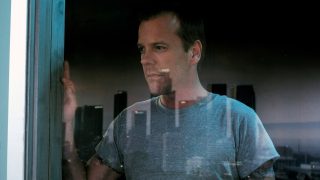
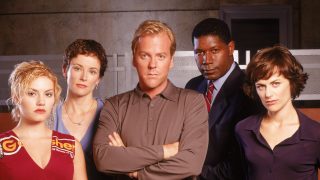
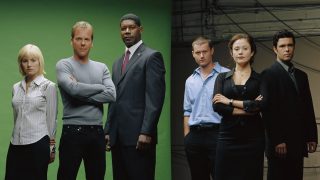
57 Comments
Comments ClosedRonnieC6
June 15, 2017 at 11:37 amThe Predictor
June 15, 2017 at 12:08 pmRonnieC6
June 15, 2017 at 1:38 pmAcer4666
June 15, 2017 at 5:24 pm24 Spoilers
June 15, 2017 at 11:37 pmBut you’re right, having a wedding in Los Angeles on the day it’s about to be nuked makes no sense.
WouldntYouLikeToKnow
June 16, 2017 at 5:04 amI guess maybe just before she died she wanted to be the absolute happiest she could possibly be?
Also, someone should make fanart of this. Lol
Dan
September 9, 2017 at 9:42 pmX
June 24, 2017 at 9:42 amEven if the plan wasn’t to escape, she just wanted to be happy if its her last day.
Marriage makes women happy for some reason.
Acer4666
June 15, 2017 at 5:39 pmTrevor
June 15, 2017 at 10:07 pmBrad
June 15, 2017 at 7:11 pmI appreciate the respectful response and counter-argument. I’m glad you found season 2 memorable. There’s a lot that’s good about it, as I highlight on numerous occasions throughout the article (including episode 15). Personally, it just doesn’t stack up for me compared to other seasons of the show. I think the poorly drawn villains and less interesting characterisations have a lot to do with that.
I knew that this article would be divisive to some extent. Season two often ranks highly for people when looking back at the show. It’s all just harmless divergent opinions in the end. :)
24 Spoilers
June 15, 2017 at 11:10 pmAnd of course episode 15 which is one of the very best – Mason’s death and entire arc was incredible. S2 also had a bunch of really awesome smaller moments that aren’t mentioned too often like Novick subtly pushing down Lynn’s finger when she tries to point him out as a traitor.
But I agree with Brad’s analysis. It just lacked that extra spark for me, and I think it was mostly because of the underwhelming villains. Eddie’s team lasts three episodes, Joe Wald only one, Nina was fantastic but only around for like five episodes… Syed is finally shown but then kind of upstaged by the Marie Warner twist just two episodes later – and they’re both captured relatively quickly before doing much of anything. That continues in the second half, the baddies were replaced too often and lacked much of an impact.
Grade wise I’d probably give it a B or B+ as it falls short of my favorites (1, 3, 5) but is very solid.
XAM
June 17, 2017 at 3:31 amX
June 24, 2017 at 9:34 amIt’s far scarier fighting an ideology, which is what was happening in Day 2.
It’s the enemy in real-life.
Most people will destroy life in order to honor customs that they were brainwashed into serving.
Dan
September 9, 2017 at 9:47 pmThe Predictor
June 16, 2017 at 9:13 amI do agree with you both that the villains of season 2 were weak in general. I didn’t care for the Peter Kingsley character. And the one inconsistency of the season was Sherry Palmer’s actions and motivations. Much of the time she seemed to be motivated by taking down David Palmer, but was she really willing to work with terrorists to make that happen?… To your other point, ’24’ is not a show that has great character development in pretty much any season. I watch Homeland to get ’24’ with character development. For me personally, I like shows that are smart, intense, exciting, and have a well thought-out plot. For me, character development is secondary to having a great plot.
Brad
June 16, 2017 at 9:18 amThanks for your input dude!
The Predictor
June 16, 2017 at 10:14 amXAM
June 17, 2017 at 3:49 amAcer4666
June 16, 2017 at 7:57 pmLouise Engel
June 16, 2017 at 2:20 pmI think that to have created an anthology approach or to have subordinated Jack to one of the other characters, even Tony, would have done away with their own best creation. We endured some silly subplots and weaker villains precisely because he was always so compelling.
Kenneth
June 20, 2017 at 5:33 amGerry Mander
June 21, 2017 at 3:14 pmAs I’ve stated before here, if it wasn’t for the pretty awful-near-unwatchable ‘wacky adventure’ subplot of Kim, Day 2 would be up there in the Top 3 of ’24’ seasons, alongside 1 and 5… people (still) moan to this day about Dana Walsh in Day 8, but she wasn’t nearly as annoying a character nor was her sub-plot as pointless or as randomly arbitrary as Kim’s in 2, I can only put it down to the writers possibly thinking initially it would lead somewhere only to realize it didn’t, it wasn’t, but they had to drag it to the finish line somehow anyway.
Kim aside, Day 2 is a killer season from start to finish; twists, turns, memorable villains, terrific action, compelling intrigue, and one of the longest and most brutal torture scenes I’ve ever seen on television (poor Jack!)… this season has it all. That being said, the seeds of the trainwreck that was Day 6 are planted here in that, as Brad said, it’s here that the plot started to define the characters rather than the characters themselves forwarding the plot as in Day 1 (and returned back to for Days 7 and 8)… this approach would escalate season on season until it came off the tracks on the aforementioned 6.
A special mention for the ‘cyprus recording’ sub-plot; a genuinely ballsy plot to use considering what was happening in the real-world at the time (spring 2003)… I bet HoGo was behind that one, in fact I would bet on it!!!
Overall, a (largely) terrific season, and another great analysis, Brad…
X
June 24, 2017 at 9:52 amIt was thrilling all the way through and it was Jack’s emotional tether to the earth.
If Kim died, so did Jack’s humanity.
And I deeply cared for Kim as well (she’s not just a satellite around Jack).
Everything that happened to her was totally plausible.
If you find out there’s a nuclear bomb about to go off and the cops are chasing you, you’re going to go off grid into nature’s territory.
There will be predators.
(That cougar/mountain-lion thing is overblown bandwagon bullshit. We see wildlife in the distance… in the wild!!! Who would have thought? Outrageous!!!! Absurd!!! )
You’re going to see wildlife.
You’re likely to come upon a cabin in the woods and who is likely to be in a cabin in the woods off the grid?
Paranoid motherfuckers!!!!
And Lonnie was pretty nice.
Most guys would want a hot babe that mysteriously arrives at their cabin, who happens to mention/confirm the doomsday scenario you’ve been preparing for all your life, to stay with them.
Deceptive? Of course.
But Lonnie thought he was doing her a favor by making her think the bomb went off before it actually did.
That way she doesn’t go roaming off to her death when it does explode.
When the bomb goes off, you’re going to see looting and panic.
Mariah Tahmisian
September 15, 2017 at 3:48 pmX
June 24, 2017 at 10:16 amDid you watch it live on television as each season came out (from the beginning)?
Did you first watch them on DVD?
Or did you start on DVD then jump in for live viewings at some point?
Or was it all DVD?
How did you discover the series and what was your viewing preference?
I started from the very beginning, watching it live on television.
I was anticipating it coming out because I had dreamed about a show like this for a long time.
24 really was a dream come true.
The tone of the first season (noir) and the nuclear bomb plot of the second season were ideas for a show I’ve had before (with the real-time aspect).
But I thought it would wind up being pretty boring.
So I watched it live up until about a little past halfway (right after Teri’s amnesia) and then lost track of viewing (school).
So I had to download the episodes off of Napster or Kazaa.
Then I watched the entire season in a few days.
Watched the second season live (best season of television I’ve ever experienced).
Nothing like it.
I would also rewatch every episode when it was rerun on FX and download them as well.
So I knew it very well.
Same with Season 3 (live viewings and rewatching episodes as the season progressed).
Very engaged.
Season 4, I watched live for a few weeks, then I relied solely on downloading it.
With Season 5, (besides watching the 2 night premiere live) I waited until it was all over and then watched it all in a few days on my computer (high quality downloads).
Season 6, watched the first 7 episodes live, but got really pissed with the way FOX spoiled the entire episode for the next week, then waited until it was all over to watch downloaded episodes transferred to DVDs.
Season 7, watched downloaded episodes onto DVDs as they came out (every 4 episodes I’d rewatch the entire released season so far).
Season 8 was unique in that I totally waited until it was all over and then watched it all for the first time in HD on my computer.
Season 9, I watched live again until final 4 episodes where I waited until it was over.
Season 10, watched first two eps live then waited until it was over.
24 was perfect to watch every week in its first few seasons because the formula and surprises were fresh and original.
But when you’ve figured out the formula and would see promos for the next week that basically spell it out for you (as a 24 fan), binge watching was the only way to go.
Waiting a week between episodes (and not rewatching frequently to keep details fresh in your mind) really kills it and is unfair to yourself (as a viewer) and the story as a whole.
You lose so much momentum and context when not watching it in a short span.
FOX really should release any future season of 24 in one big package (ala Netflix).
It is the current and future way to view a series.
All fluff that is in each episode, that they try to subtly put in there to refresh viewers on what’s going on, can be nixed.
I remember this so much in Season 4: Jack would hurry somewhere at the beginning of every episode, with Tony right behind him, saying that they need to stop Marwan and the missiles.
Who are you talking to, Jack?
Tony knows what’s going on.
What the fuck are you doing?
Brad
June 25, 2017 at 4:10 amLoved reading your personal experience with the series. Mine is very similar as a matter of fact. I live in Australia and the show first premiered in early 2002. I was a couple of episodes late, but I watch three quarters of the season each week as it aired. I also lost track of season two after a few weeks due to school commitments.
More or less, I’ve watched the entire series as it has aired. Nothing quite replicates the feeling of having to wait a week for a new episode and letting the last one sink in. They are wonderful memories.
X
June 25, 2017 at 4:20 pmThat really enhanced the week to week experience.
Really in depth discussion (similar to here but in a much better, more specific, topic board format).
So many wonderful theories and analyses.
Season 7 felt like a love letter to the fans of those boards because it was total wish fulfillment:
Tony coming back from the dead,
Tony going bad (theorized in the first three seasons),
Jack contracting a deadly virus and racing to find a cure (theorized during season three),
a rebel underground CTU,
the organization behind a lot of the bad things that happened through the series.
I remember asking Howard Gordon or Jon Cassar (I used to get the two mixed up, but I was always actually picturing Jon Cassar) in a Q&A for the season 7 premiere if we’d finally see the organization behind everything (like those people trying to control Palmer in season one).
His exact answer: “Very possibly.”
I tapered off from there around season 5 and 6 because I think spoilers were getting out of hand (and I think they may have dumped a lot of history, rebooting the boards, pissing off long-time fans).
I was banned in season 7 for writing a monologue against FOX not showing 24 in widescreen (they started in widescreen then went back to fullframe, for non-HDTVs).
Of course, that could have just been my specific FOX station.
I refused to watch it live if it wasn’t in widescreen (leading me back to relying on pirated episodes).
The monologue was aping a Forest Whitaker speech where he’s fed up that no one can see what Vic Mackey is doing (from The Shield).
The mod there at the time did not get it and banned me.
The format and tone of the board had changed anyway, so I didn’t mind not being there anymore.
Brad
June 25, 2017 at 7:27 pmXAM
June 29, 2017 at 1:02 pmhttp://www.nme.com/festivals/glastonbury/kiefer-sutherland-jeremy-corbyn-glastonbury-2094622
Brad
June 29, 2017 at 7:19 pmMilo
June 30, 2017 at 10:41 amMarlon
July 4, 2017 at 6:26 amJack Power
July 4, 2017 at 11:12 amAccording to this site Kiefer Sutherland political views are:
He is very liberal, endorsed Obama, supports gun control, and disagrees with the use of torture.
The opposite of Jack Bauer’s political views.
Trevor
July 14, 2017 at 1:00 pmKal_290
July 5, 2017 at 7:29 pmTrevor
July 14, 2017 at 1:01 pmJoshua
July 3, 2017 at 2:37 amGerry Mander
July 4, 2017 at 2:43 pmMaggie
July 5, 2017 at 4:12 pmBrad
July 8, 2017 at 12:40 amTo be clear, I don’t dislike season two at all. I think it’s generally great. It lacks a certain spark for me, but there’s so much that works so well. The fact that the show was able to draw more life from its format (and do it again an additional 7 times) is astounding and worthy of commendation.
It’s a shame. I generally agree with XAM’s thoughts on 24, but while he’s always been a bit stand-offish, it seems he has been swept up in the ‘right wing vs left wing’ hysteria engulfing large portions of the internet these days.
Danny
July 5, 2017 at 4:50 pmThe Predictor
July 6, 2017 at 4:32 pmLonnie
July 5, 2017 at 7:19 pmMarlon
July 6, 2017 at 12:05 amJust pay Kiefer and get the ball rolling!
Gerry Mander
July 6, 2017 at 5:47 amBig Boss
July 6, 2017 at 9:13 pmJack Power
July 6, 2017 at 11:43 amSo it’s not a question of money.
Anthony Chetcuti
July 6, 2017 at 1:29 pmJoshua
July 7, 2017 at 4:33 amRonnieC6
July 7, 2017 at 12:23 pmMarlon
July 9, 2017 at 8:29 amThis will probably be after Designated Survivor is over.
On another note: Is there anyway they can delete 24: Legacy from the record books? It really shouldn’t be included in any kind of way in the 24 timeline.
Milo
July 10, 2017 at 10:43 amJoshua
July 12, 2017 at 3:17 amMidsomer
July 16, 2017 at 7:18 amBrad
July 16, 2017 at 11:03 pmI submitted the next article over a week ago, but the admin has been busy recently. Understandably, it has not yet gone live. It should be up in a few days or so. :)
Midsomer
July 17, 2017 at 12:13 am